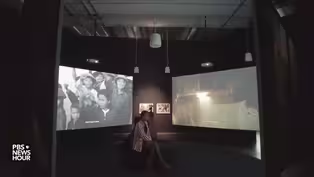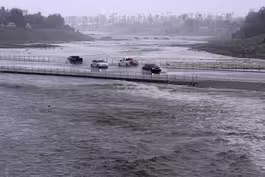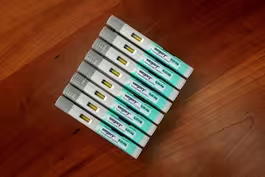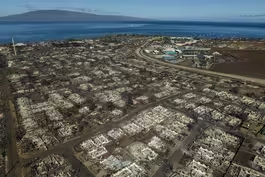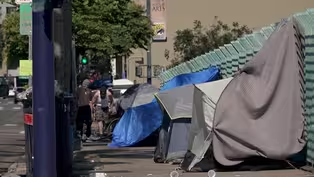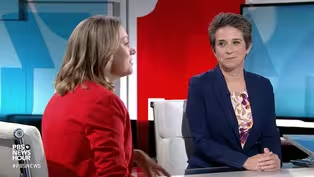
Anti-corruption outsider triumphs in Guatemala election
Clip: 8/21/2023 | 7m 49sVideo has Closed Captions
How an anti-corruption outsider triumphed in Guatemala's presidential election
This weekend the results of two Latin American elections seem to reflect a desire for democratic change. In Ecuador, a millennial entrepreneur will face the establishment leftist candidate in a runoff and Guatemalans elected an anti-corruption politician who overcame establishment assaults on democracy. Nick Schifrin discussed more with Will Freeman.
Problems playing video? | Closed Captioning Feedback
Problems playing video? | Closed Captioning Feedback
Major corporate funding for the PBS News Hour is provided by BDO, BNSF, Consumer Cellular, American Cruise Lines, and Raymond James. Funding for the PBS NewsHour Weekend is provided by...

Anti-corruption outsider triumphs in Guatemala election
Clip: 8/21/2023 | 7m 49sVideo has Closed Captions
This weekend the results of two Latin American elections seem to reflect a desire for democratic change. In Ecuador, a millennial entrepreneur will face the establishment leftist candidate in a runoff and Guatemalans elected an anti-corruption politician who overcame establishment assaults on democracy. Nick Schifrin discussed more with Will Freeman.
Problems playing video? | Closed Captioning Feedback
How to Watch PBS News Hour
PBS News Hour is available to stream on pbs.org and the free PBS App, available on iPhone, Apple TV, Android TV, Android smartphones, Amazon Fire TV, Amazon Fire Tablet, Roku, Samsung Smart TV, and Vizio.
Providing Support for PBS.org
Learn Moreabout PBS online sponsorshipAMNA NAWAZ: This weekend, the results of two Latin American elections seem to reflect a desire for democratic change.
In Ecuador, a millennial entrepreneur will face the establishment leftist candidate in a run-off.
And Guatemalans elected an anti-corruption politician who overcame establishment assaults on democracy in a key U.S. ally.
Nick Schifrin reports.
NICK SCHIFRIN: When the corrupt ones came from for Guatemalan democracy, they missed the crusader.
Bernardo Arevalo told Guatemalans, yes, they could fight corruption, and he and his party came out of nowhere to overcome a political establishment that tried to silence him.
Last night, his supporters celebrated a watershed election they hoped heralded a better future.
BERNARDO AREVALO, Guatemalan President-Elect (through translator): What the people shout about is, enough of so much corruption.
NICK SCHIFRIN: Arevalo reached out to urban and young voters in Central America's most populous and one of its most unequal countries.
Widespread poverty and food insecurity accelerated by climate change, as well as widespread crime, has spiked migration.
More Guatemalans risk the journey north to try and enter the U.S. than from any other Latin American country.
But, in the end, voters chose the politician who vows to block what he calls the establishment's political persecution of its enemies.
JUAN JOSE ALVAREZ, Guatemala Citizen (through translator): A change for something good, that's what we hope for, that they don't let us down once again.
NICK SCHIFRIN: In Ecuador, that hope helped push 35-year-old entrepreneur Daniel Noboa to second place in the first round of voting.
He's the son of a former presidential candidate and from one of Ecuador's richest families, but he ran as an outsider, appealing to female and younger voters.
DANIEL NOBOA, Ecuadorian Presidential Candidate (through translator): The most ignored demographic - - and we can see it -- is the youth, also a lot of female votes.
NICK SCHIFRIN: He will face the front-runner and establishment leftist, Luisa Gonzalez.
The country faces an unprecedented wave of violence, including the assassination of presidential candidate Fernando Villavicencio during the campaign.
And security and the economy are likely to be the key issues in Ecuador's run-off election scheduled for October.
For more, we turn to Will Freeman.
He's a fellow for Latin American studies at the Council on Foreign Relations.
Will Freeman, thanks very much.
Welcome to the "NewsHour."
Let's start in Guatemala.
How significant is Bernardo Arevalo's election.
WILL FREEMAN, Council on Foreign Relations: We're talking about the most historic election in a generation, maybe two, maybe three.
This is Guatemala's best shot at turning the corner from decades of corruption, of capture of the state by criminal organizations.
Arevalo is giving Guatemalans a sense of hope that I don't think they have had, that I haven't seen in my time visiting the country for years.
And let's hope that he's able to deliver on those promises.
NICK SCHIFRIN: And yet how surprising is it that he was able to overcome a system that was frankly stacked against him and other critics of the government?
WILL FREEMAN: Well, surprising in several respects.
I mean, it's not only that he overcame an attempt by the judicial system to remove him from the race.
He and his team weathered security threats that they were telling me about firsthand days ago.
It's also that they campaigned with basically no budget.
I mean, they were up against a rival who was financed to the tune of millions.
They were traveling around in their own personal cars visiting rural villages, I went with them.
I saw they recycled the same fliers from campaign stop to campaign stop.
We're talking about a campaign that was built entirely on ideas.
And, amazingly, in this context in which that never happens, it worked.
NICK SCHIFRIN: The United States revoked the visas of the attorney general and a judge, both of whom the U.S. labels corrupt.
The European Union, the Organization of American States also spoke out when it comes to this election.
Did those moves, especially by the U.S., make a difference?
WILL FREEMAN: You know, I do think that they sent a clear and strong message to antidemocratic elements in Guatemala's political class that an attempt to out -- overthrow these elections, to overturn the results would come with serious consequences.
Now, I still think that most of the credit should go to Guatemalan civil society, should go to the campaign of Arevalo, which really mustered the bottom of support you needed to make sure there was a free and fair process here.
But the support from the U.S., the E.U., the Organization of American States, that was all essential.
And I think had those international actors not been paying attention, we might have seen a really different and more troubling outcome here.
NICK SCHIFRIN: Arevalo does not control any other piece of the government.
Congress, the courts are stacked against him.
What are the challenges he's going to face, even perhaps in security, especially given that he doesn't take power until January?
WILL FREEMAN: The first and I'd say the biggest challenge is that the three criminal cases launched against his party without evidence remain open.
Now, for the moment, he is riding high.
He has this groundswell of support.
That doesn't protect him from one of these baseless prosecutions.
I'm worried that members of his party could be put under a pretrial detention.
If not that, certainly, I think we're going to see the opposition in Congress pass a very limited budget this fall that goes into effect the next year.
I think we're also going to see them try to stack the judiciary with even more judges aligned with their interests.
So, really, it's all going to put a lot of obstacles in front of his agenda from day one.
NICK SCHIFRIN: Let's switch to Ecuador.
Who is Daniel Noboa, and how surprising is it that he finished second?
WILL FREEMAN: Well, Daniel Noboa is the 35-year-old son of Alvaro Noboa, a longtime presidential candidate in Ecuador and one of Ecuador's richest men.
He comes from a family fortune, and he himself doesn't -- Daniel doesn't have much experience in politics.
He's served in Congress for one term, ran previously for president.
But he's not a household name.
Look, I found it surprising.
Then, again, I will be honest with you.
In most first round elections in Latin America these days, it's like rolling a dice.
NICK SCHIFRIN: And rolling the dice in an election marked by violence.
How concerning is it that Ecuador, of all countries -- we didn't expect this -- Ecuador suffered the kind of political violence that we saw during this campaign?
WILL FREEMAN: This is tragic.
No one expected a presidential candidate like Fernando Villavicencio to be gunned down in public.
And, in fact, after that, two other candidates, including Noboa himself, were caught -- were caught up in crossfire of shoot-outs between criminal gangs.
So I think it's going to make it very hard to develop a normal democratic election, to carry on with campaign activities.
What has me most concern is that I'm not sure that either of the two candidates that made it to the run-off for October 15 really have a serious agenda to tackle this problem.
NICK SCHIFRIN: And I don't want to overemphasize any connections between these two elections.
The backstories here are very different.
But are these two elections signs for those in the region advocating for democracy, advocating for free and fair elections?
WILL FREEMAN: I do think we see a parallel.
But it has more to do with the failings of the state.
So, although democracy is holding steady in a lot of Latin America and a lot of countries, it's actually been fine, it hasn't collapsed, what we are seeing are state institutions that are increasingly debilitated by corruption, which increasingly fail to stand up to organized crime.
You're seeing that in Mexico.
You're seeing it almost everywhere south.
And so I think what we will see in both these cases is, whoever is elected the next president of Ecuador, and certainly in the case of Arevalo, they will have a short honeymoon period.
They might be the outsiders for now.
But, in six months or a year, there will be the president.
They will be the one who's bearing some responsibility for whether these problems are solved or not.
So, my message to presidents in Latin America these days are, honeymoons are short.
And, really, it's just an unforgiving landscape for politicians these days.
NICK SCHIFRIN: Will Freeman of the Council on Foreign Relations, thank you very much.
WILL FREEMAN: Thank you.
Artist examines legacy of Vietnam War and impact on his life
Video has Closed Captions
Clip: 8/21/2023 | 6m 24s | Artist examines legacy of Vietnam War and its impact on his own life in new exhibition (6m 24s)
California cleaning up after first tropical storm in decades
Video has Closed Captions
Clip: 8/21/2023 | 2m 54s | Southern California begins cleaning up after first tropical storm in 8 decades (2m 54s)
Costly weight loss drug may also cut risks of heart attacks
Video has Closed Captions
Clip: 8/21/2023 | 7m 5s | Study shows costly weight loss drug may also cut risks of heart attacks (7m 5s)
Questions and anger emerge over Maui wildfire response
Video has Closed Captions
Clip: 8/21/2023 | 6m 28s | Questions and anger emerge over Maui wildfire response and lack of communication (6m 28s)
States confront mental health crisis with coerced treatment
Video has Closed Captions
Clip: 8/21/2023 | 9m 45s | States look to involuntarily hospitalize people to confront growing mental health crisis (9m 45s)
Tamara Keith and Amy Walter on Trump skipping 1st GOP debate
Video has Closed Captions
Clip: 8/21/2023 | 8m 30s | Tamara Keith and Amy Walter on 1st GOP debate and Trump's plan to skip it (8m 30s)
Providing Support for PBS.org
Learn Moreabout PBS online sponsorship
- News and Public Affairs

FRONTLINE is investigative journalism that questions, explains and changes our world.

- News and Public Affairs

Amanpour and Company features conversations with leaders and decision makers.












Support for PBS provided by:
Major corporate funding for the PBS News Hour is provided by BDO, BNSF, Consumer Cellular, American Cruise Lines, and Raymond James. Funding for the PBS NewsHour Weekend is provided by...
